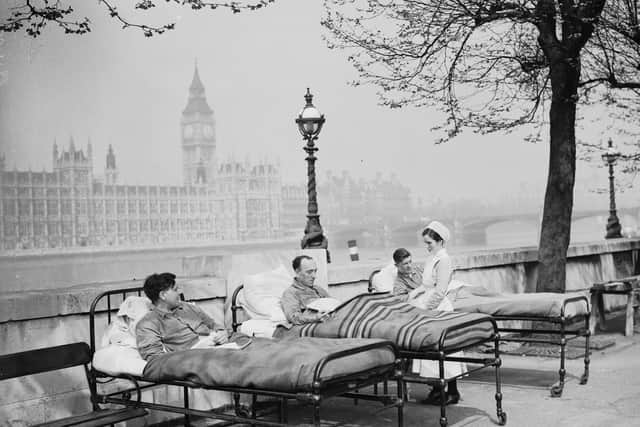Victorian diseases: Nurse killed by Tuberculosis found out just hours before she died
and live on Freeview channel 276
Victorian diseases long believed to be conditions of the past are making a comeback in the UK with cases of conditions like Tuberculosis (TB), scabies, measles and rickets on the rise.
In a report by The Observer, there are now three scabies cases per 100,000 population in England, which translates to 2,000 a year, whilst 423 patients were admitted to English hospitals for rickets in 2022 and cases of sexually transmitted diseases, such as syphilis were up 15% to 8,692 in 2022 - the highest recorded case number since 1948.
Advertisement
Hide AdAdvertisement
Hide AdSir Michael Marmot, director of the Institute of Health Equity at University College London said: "The idea we are starting to suffer the same diseases that in Victorian times people on long ocean voyages suffered because of the shortage of citrus fruits is simply horrendous." TB, a condition that affects the lungs can be life-threatening if left untreated. There were 4,850 cases in England in 2023, up more than 10.7% compared to 2022 (4,380 cases) and the highest recorded since 2017.
The rise in figures comes after the tragic incident of 30-year-old RAF nurse, Carrianne Franks, who died after being exposed to TB. Franks, who had been volunteering on a hospital ward, found out less than 24 hours before she died that she had contracted the Victorian disease.
The RAF sergeant, had worked as a flight nurse for 10-years and was on a three-year deployment at London's Chelsea and Westminster Hospital during the Covid pandemic when she was exposed to TB in November 2020. A damning report from a coroner into her death found that she should have been warned of her exposure months earlier.
The day before she died, the 30-year-old sent a worried text to her parents after she had finally received her diagnosed. She told her mum, Bev: "Mum, they found out what I have. I've got TB." She was quickly placed into a coma in intensive care, where she tragically passed away before her family were able to say goodbye.
Advertisement
Hide AdAdvertisement
Hide AdMedical staff who come in contact with diseases such as TB are supposed to be given a "warn and inform" letter so they can be aware of the symptoms and let health professionals treating them know what to look out for. However, Franks did not receive this as she had not been the "named nurse" or in close contact with the patient for eight hours, meaning she did not qualify according to the NICE guidelines.
In an interview with the Mirror, her mother Bev said: "The expert told us if she had been diagnosed right up to two weeks before she died, she would have survived. They gave her Covid meds because they were convinced it was that, despite negative lateral flows and PCR tests, those drugs lowered her immune system." Following her death they have been calling for the NICE guidelines to be changed to protect nurses.
A Chelsea and Westminster Hospital NHS Foundation Trust spokesperson said: "We are deeply saddened by the loss of a valued and supportive member of the nursing team and we offer our heartfelt condolences to Carrianne’s family, friends and colleagues. We strive to provide the safest possible environment for our staff to work in and we have reviewed our TB policy and have taken actions to ensure that all staff are aware when they are working on a ward where TB patients are cared for. Our thoughts remain with Carrianne’s family and friends."


What are the symptoms of Tuberculosis?
Tuberculosis (TB) is an infection that affects the lungs, it can be treated with antibiotics, however if left untreated can become serious. Symptoms of TB according to the NHS usually come on gradually. They can include:
Advertisement
Hide AdAdvertisement
Hide Ad- a cough that lasts more than 3 weeks – you may cough up mucus (phlegm) or mucus with blood in it
- feeling tired or exhausted
- a high temperature or night sweats
- loss of appetite
- weight loss
- feeling generally unwell
There is a vaccine for tuberculosis (TB) called the BCG vaccine, which used to be offered to all school children aged 10-14 until 2005. The scheme was dropped as children were believed to be the lowest at risk of contracting the disease. The BCG is still offered to people who at higher risk of catching TB or who could become seriously ill from it. You can find out more about who is eligible for the BCG on the NHS website here.
Sarah McCann is a Trends Writer for NationalWorld who specialises in stories around TV, Film and Health. If you liked this article you can follow Sarah on X (Twitter) here. You can also share your thoughts in the comment section below.
Comment Guidelines
National World encourages reader discussion on our stories. User feedback, insights and back-and-forth exchanges add a rich layer of context to reporting. Please review our Community Guidelines before commenting.
